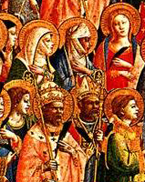
Council of Nicaea (325)
The Council of Nicaea was a council of Christian bishops convened in Nicaea in Bithynia (present-day Iznik in Turkey) by Emperor Constantine I in AD 325.
Constantine invited all the bishops to attend, between 250 and 350 did attend.
The synod specifically dealt with:
1. The Arian question regarding the relationship between God the Father and Jesus. The Council declared that the Father and the Son are of the same substance and are co-eternal, basing the declaration in the claim that this was a formulation of traditional Christian belief handed down from the Apostles. This belief was expressed in the Nicene Creed.
2. The date of celebration of the Paschal/Easter observation. Pascha was separated from the Jewish Calendar, though no specific calculations were suggested. This led to a number of other problems later. The Julian Calendar was used for the Christian computations.
3. The Meletian schism (Bishop Meletus was circumscribed to remain in his see with no ability to ordain. All his priests were re-ordained.)
4. The validity of baptism by heretics was declared invalid although who were counted as "heretics" remained undefined.
5. The status of the lapsed in the persecution under Licinius. Procedure established to return them to the Church.
Finally, the council promulgated a number of new church laws or canons.
1. Prohibition of self-castration
2. Establishment of a minimum term for catechumen
3. Prohibition of the presence in the house of a cleric of a younger woman who might bring him under suspicion
4. Ordination of a bishop in the presence of at least three provincial bishops and confirmation by the metropolitan
5. Provision for two provincial synods to be held annually
6. Exceptional authority acknowledged for the patriarchs of Alexandria and Rome, for their respective regions
7. Recognition of the honorary rights of the see of Jerusalem
8. Provision for agreement with the Novatianists
9-14. Provision for mild procedure against the lapsed during the persecution under Licinius;
15-16. Prohibition of the removal of priests;
17. Prohibition of usury among the clergy;
18. Precedence of bishops and presbyters before deacons in receiving Holy Communion, the Eucharist;
19. Declaration of the invalidity of baptism by Paulian heretics;
20. Prohibition of kneeling during the liturgy, on Sundays and in the fifty days of Pascha
On July 25, 325, in conclusion, the fathers of the council celebrated the emperor's twentieth anniversary. In his valedictory address, Constantine again informed his hearers how averse he was to dogmatic controversy; he wanted the Church to live in harmony and peace. In a circular letter, he announced the accomplished unity of practice by the whole Church in the date of the celebration of Christian Pascha.




